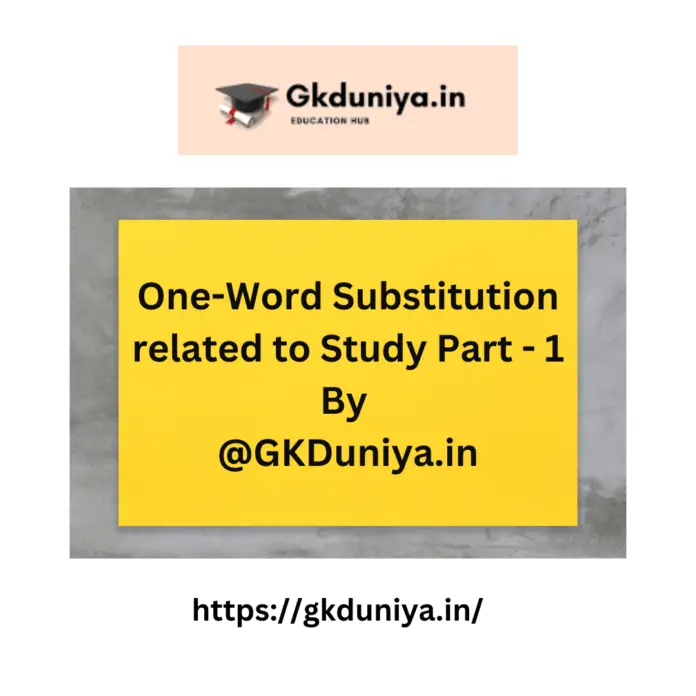One Word Substitution related to Study Part – 1
One-Word Substitution related to Study:- One of the most important vocabulary topics is one-word substitution. Questions based on this idea require you to substitute a suitable word for a given sentence, as the name suggests. One-word substitution is an important English language idea because it makes communication much easier, more clear, and more concise.
One-Word Substitution questions are those in which a single word that sums up the entire sentence or phrase is used in its place. The sentence structure is more precise when a single word is substituted. Numerous national-level exams, including the SSC CGL, SSC CSHL, UPSC, Defence Exams, and other competitive exams, frequently feature one-word substitution questions. Framing sentences or visualizing the words through an engaging story is the most effective method for understanding the concept of one-word substitution.
Examples of one-word substitution Let’s examine one-word substitution using the following examples:
-
This person despises humanity: This individual is a miser.
-
Her younger son has a severe apprehension of dogs: Her son is cynical.
-
The study of ancient things interests me: My field of study is archaeology.
-
That young man maintains a very reserved and conservative demeanor: That young man is shy.
-
She is someone who presents an idea that she does not hold herself to: She is dishonest.
List of One-Word Substitutions
The categories of One Word Substitution in English Grammar can be categorized into the following-
-
Study-related
-
Types of Fear
-
Terms-related
-
Group/Collection
-
Likes/Dislikes
-
Government/Political Systems-related
-
People/Person
-
Profession/Occupation
-
Science/Research
-
Killing/Death-related
-
Sound/Event/Spots
Improve your vocabulary by learning the One Word Substitution for each category in the section below.
Study-related One-word substitutions
| One Word Substitution related to Study | ||
| S. R. No. | One Word Substitution | Phrases |
| 1 | Aviation | Study of flying airplanes |
| 2 | Astronomy | Study of celestial bodies |
| 3 | Alchemy | The philosopher’s stone and the ancient search for a universal cure Chemistry as taught in the Middle Ages |
| 4 | Acoustics | Study of sound/sound waves |
| 5 | Anthropology | The study of how people changed over time |
| 6 | Astronomy | Study of Stars |
| 7 | Botany | The study of plants |
| 8 | Biology | Study of Living Things |
| 9 | Calligraphy | Art related to ornate, good handwriting |
| 10 | Chronology | The science of time order |
| 11 | Demography | The study of statistics |
| 12 | Entomology | Study of science of insects |
| 13 | Ecology | Study of the relationship between the organism and their environment |
| 14 | Genetics | study of genes, inheritance, and variation in living things |
| 15 | Geology | The study of rocks and soil |
| 16 | Geography | Mapping of its formation and earth |
| 17 | Graphology | Study of handwriting |
| 18 | Gerontology | Study of various aspects of aging |
| 19 | Hydraulics | investigation of the flow of water and other liquids’ laws |
| 20 | Lexicography | The practice of writing dictionaries |
| 21 | Numismatics | Examine the coin, token, and paper money collections. |
| 22 | Ornithology | Study of birds |
| 23 | Philology | The study of languages |
| 24 | Paleography | The study of ancient writing and scriptures |
| 25 | Psychology | The study of the Human Mind |
| 26 | Psephology | Study of election trends |
| 27 | Theology | Study of religion |


